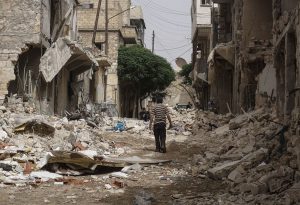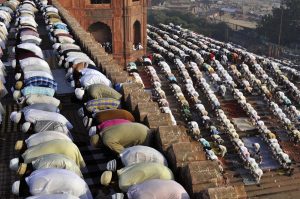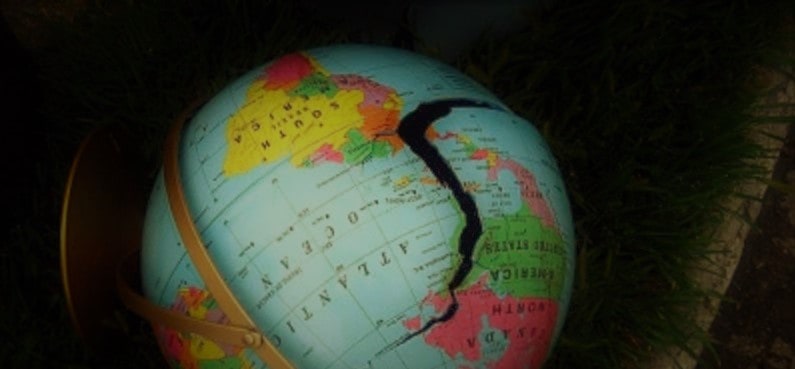This article looks at the notion that the Ummah is going through suffering, being denied of victory and authority, on account of her sins. We have heard it from the pulpits. We have heard it in this lecture or that conference. Too many times to enumerate. We heard it when Afghanistan was invaded, likewise Iraq, when calamities hit Burma, CAR, Pakistan, Egypt, Syria…now we hear it for Aleppo.
But how much water does this narrative carry? Not much, on examination.
The problem with the argument that calamities such as Aleppo are punishments for our sins is not in the premise that sins have adverse consequences. Rather, the problem with it is two-fold: one, it’s a superficial assessment that does not make any solid case for the judgment; and two, the entire otherwise multi-dimensional and complex matter is boiled down to the issue of our (personal) sins, ignoring so many other aspects of the issue and Ahkam of the Deen.
Yes, sins have negative consequences for individuals and communities and can lead to the affliction of calamities. There should be no doubt about this. But not every calamity or adversity is a punishment for sin. There are many other reasons for which a calamity may befall.
It can be a means by which Allah (swt) tests people to see how they will respond (2:155; 21:35), to see who will persevere and fight and who will falter (47:4,31), to examine the Sabr and Taqwa of the believers (3:186), to scrutinise the state of our hearts (3:154), to make distinct the good from the evil (3:179, 8:37), the believers from the hypocrites (33:11), or to choose people for the high rank of shaheed (3:139). The common thread of all these is Allah putting people through a trial or tribulation for one end or another, not because they are doing the wrong thing but because this it is part of the point of the worldly life.
Indeed, it can be because you’re doing the right thing since, as per the hadith, the most tried people are the Prophets, then the next best and the next best:
“A person is tested according to his adherence to the deen. If he is steadfast, he will be tested more severely…” (Ibn Majah)
Indeed, many a calamity hit the Prophet ﷺ, the Sahaba and the Salaf. Were these all punishments because they were sinners? Was all the persecution in Makkah of the Companions because they were sinners? Were the battles in Madinah because they were sinners? Were the fitan among the Companions after the Prophet ﷺ – which entailed calamities of immense proportions – because they were sinners? Clearly not!
Thus, it is a superficial assessment when every calamity is interpreted as a punishment without considering the other options. Indeed, one would argue that the case for these calamities being trials is much stronger. Consider, for instance, that the Ummah as a whole is in fact moving closer to the Deen. She is in a better position relative to where she was 20/30/40 years ago.
Who can deny that more Muslims, particularly in the younger generations, are closer to the deen? There are more young men and women practicing the Deen than there have been in the last 80 years. There are more people in the Masajid. Every Jumu’a place is packed to the rafters. More and more Muslims are learning Arabic and seeking knowledge. Muslims generously give at every fundraising event on the back of which so many of our Masajid and centres are operating. More Muslims are involved in Da’wah initiatives. The calls for the implementation of Islam grows by the day globally. And so on and so forth.
Now, the point is not the things are perfect, far from. There’s still a long way to go – but the *trajectory* is undeniably in the right direction. Which raises the question: if the Ummah is moving towards Allah (swt), however slowly, would His response be to punish her? Or to test the veracity of this move as a means to facilitate it? The latter, surely! By Allah, the former is not way of the Rabb of Muhammad ﷺ. It is not the Allah we know. The Allah we know is He who when the slave makes the slightest move towards Him, He reciprocates by a greater extent: “and if (the slave) come to me walking, I go to him running”.
This narrative is also superficial because it does not consider the implications of the argument. If indeed the Ummah is being punished for her sins, we would expect the worst sinners to be punished the most. In fact, you’d expect that Muslims in the West, who live amongst the kuffar enjoying the most decadent lives engrossed in dunya, would be punished first! But no, apparently if some spoilt Muslims in Australia miss Fajr and backbite their other spoilt Muslim friends over a Gloria Jeans coffee with a couples of sides, the consequence is Muslims in Syria being decimated by barrel bombs. Really?!
Having said that, this superficiality would be the lesser problem with the argument. The bigger problem is that otherwise complicated and multi-dimensional issues – with a host of political and military variables – are reduced to “it is because of yours sins”. No need for actual analysis of what is going on (in any given conflict), who the players are, what their interests are, what they seek to achieve, who they use and how they do so; and, given all this, what the Islamic position is and what we should be doing about it all specifically. No need for any activism on the issue itself. No enjoining the good and forbidding the evil. No changing the munkar with the tongue. No accounting of tyranny. Just “it’s because of your sins” so go work on yourself.
This is where the whole narrative becomes very problematic. It is as if the actual issue (Aleppo, for instance) is just a place-holder for saying what you were saying before it occurred and would have said even if it had not. The actual issue makes no difference because you are not directly addressing it at all. So you’re left with working on yourself (which your meant to do anyway, always and everywhere) and things like du’a and charity, which are extremely important in their own right but are supplementary actions. As for actions that directly address the issue, the direct Asbab Allah (swt) asks us to take: nothing. Zilch.
As if that whole area of our Deen does not exist.
And that is the great travesty of this narrative and approach.
This article was originally a status made by brother Uthman Badar on Facebook.
![]()

















